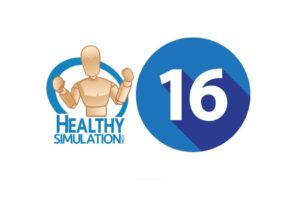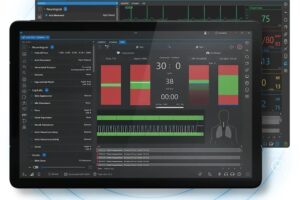Sentinel U Ensures Lifelike, Inclusive Virtual Learning Environments
Nursing education is one of the many areas of medical learning that healthcare simulation has helped to advance through enhanced training experiences. Yet, there is always more work to be done by the clinical simulation community to help advance medical simulation technologies, their implementation, and how they are used to convey important elements of patient care. This article shares details from a Minority Nurse interview in which Vivienne Pierce McDaniel DNP, MSN, RN, the diversity equity, and inclusion consultant for Sentinel U, explains how the technology increases learning while creating a lifelike healthcare environment that is sound and inclusive.
According to McDaniel, healthcare outcomes ultimately depend on how well prepared nurses are to address the social determinants of health and to provide equitable care across the continuum of care. This is why Sentinel U values nurses and is committed to healthcare equity through the company’s products. She notes that all products are created to expose the learner to a diverse set of patients.
To best prepare learners for the various situations and patients they could encounter during their nursing practice in the field, Sentinel U remains committed to representing accurate and realistic diversity of all forms. This helps nurses gain essential skills whether they practice in a highly diverse community or in a more homogeneous community. Further, by incorporating clinical simulation experiences, Sentinel U extends the opportunity for learners to learn at their own pace.
Sponsored Content:
“It allows nursing students and novice nurses to increase their critical thinking and develop sound clinical judgment in an environment that is risk-free,” McDaniel told Minority Nurse. “Because the simulations are realistic but tech-based, nurses can make mistakes without the risk of any harm.”
According to the article, she believes that diverse healthcare simulations “offer a robust pedagogy for teaching diversity and inclusion concepts as they apply directly to nursing.” Therefore, nurses can become more aware of any implicit bias they may have to unique patient identifiers, such as an accent or condition. McDaniel shares that diverse simulation experiences also help learners to become aware of the subtle ways their implicit biases may impact their quality of healthcare through terminology they use or an assumption they hold.
Proving Sentinel U and McDaniel’s commitment to diversifying healthcare simulation for the benefit of patients and learners, she recently spent time reaching out to a leader of an indigenous tribe. According to Minority Nurse, this was to make sure a specific clinical simulation she was reviewing was accurate.
The article reports that she also wanted to gain additional insight into how Sentinel U can fine-tune the company’s solutions, as these details can make a big difference in a nurse’s quality of care. This guidance was immensely important to McDaniel and the company because “People from underrepresented and underserved populations are going to be the first to notice that there’s bias and a lack of cultural competence and sensitivity,” she says.
Sponsored Content:
REGISTER TODAY: Champions of Simulation Virtual Symposium
- Wed. April 13th, 2022 | 8AM-4PM PDT, UTC-7
- Join Live & View Recordings for 3 Months
- 6 CEs Offered | CMEs in Application
“To me it’s pivotal,” McDaniel told Minority Nurse. “Simulation healthcare-based interventions help them achieve that. To achieve diversity, you must first foster an environment that’s inclusive and equitable.”
- Population and Community Health
- Telehealth
- Leadership And Management Quality
- Medical-Surgical
- Pediatrics
- Maternal Health And OB
- Mental / Behavioral Health
- Prioritization And Delegation
- Geriatrics
- Clinic-based Care
- Capstone, Integrated Concepts, Family, and Social Work
- Nurse Practitioner
HealthySimulation.com LEARN Sentinel U Recorded Webinar
HealthySimulation.com’s webinar platform “LEARN” provides the greater healthcare simulation community with the presentation titled “The Rapid Acceleration of Virtual Simulation in Nursing Education.” As part of the mission to extend guidance, support, and resources to continue innovation and advancement efforts, this webinar offers 1 Contact Hour of RN CE.
Presented by Laura Gonzalez PhD, APRN, CNE, CHSE-A, ANEF, FAAN, a VP at Sentinel U, and President-Elect for INACSL, this HealthySimulation.com one-hour beginner webinar will explore the pandemic’s continued impact on instruction, and how virtual simulation will continue to play an important role in nursing education for years to come. The informative and educational panel discussion also helps learners and educators to better appraise current literature related to clinical simulation use during the pandemic. After participation in this discussion opportunity, they will be able to identify opportunities for the inclusion of simulation in their curriculum and apply strategies for simulation beyond the simulation lab.
More About Sentinel U
Sentinel U, formerly Healthcare Learning Innovations, is an e-learning company that works to meet the evolving needs of healthcare education and training by providing simulation-based technologies and virtual learning tools. Founded in 2013, Sentinel U helps advance nursing academic education and healthcare professional training through virtual clinicals that are engaging, effective, and economic. Aligning outcomes with AACN BSN Essentials, QSEN Competencies, and NCLEX categories, Sentinel U provides nursing learners and practicing nurses with online simulations that are convenient to safely practice healthcare and patient scenarios anywhere, at any time, while earning virtual clinical hours.
All virtual simulations and clinicals are designed by Sentinel U’s Nursing faculty to help ensure that users can confidently and seamlessly map directly to AACN essentials, QSEN competencies, and NCLEX categories. According to Sentinel U, learners benefit from robust learning experiences that independent research has shown to be effective and to achieve required competencies.
The goals of Sentinel U’s digital solutions are to sharpen clinical reasoning, decision-making skills, and critical thinking competency while facing realistic patient encounters. They can also be used to practice community health and population health in a risk-free environment, and engage in realistic patient encounters across healthcare simulation settings.
Learn More About Sentinel U Virtual Simulation Solutions
Reference:
Quinn-Szcesuil, Julia. “Vivienne McDaniel Ensures Inclusion in Nursing Simulation.” Minority Nurse, 25 Feb. 2022, https://minoritynurse.com/vivienne-mcdaniel-ensures-inclusion-in-nursing-simulation/?fbclid=IwAR1infWS4aYqMBeujEC1DLb6EDErMO18YH8oRQd3R2jW_00TMqzdMlBf5L4.
Lance Baily, BA, EMT-B, is the Founder & CEO of HealthySimulation.com, which he started while serving as the Director of the Nevada System of Higher Education’s Clinical Simulation Center of Las Vegas back in 2010. Lance is also the Founder and acting Advisor to the Board of SimGHOSTS.org, the world’s only non-profit organization dedicated to supporting professionals operating healthcare simulation technologies. His co-edited Book: “Comprehensive Healthcare Simulation: Operations, Technology, and Innovative Practice” is cited as a key source for professional certification in the industry. Lance’s background also includes serving as a Simulation Technology Specialist for the LA Community College District, EMS fire fighting, Hollywood movie production, rescue diving, and global travel. He and his wife Abigail Baily, PhD live in Las Vegas, Nevada with their two amazing daughters.
Sponsored Content:




















